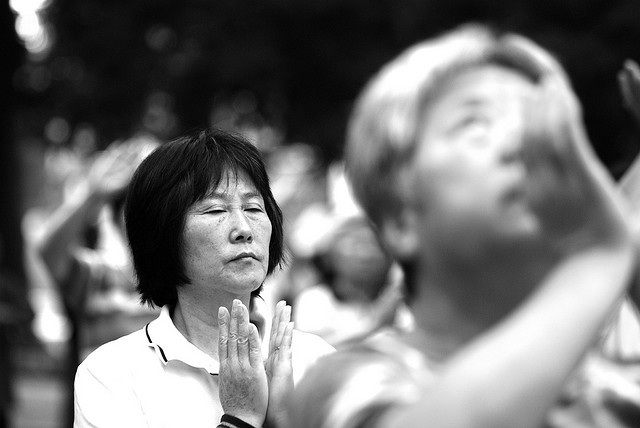The fastest moving part of his body is his long beard hair, oscillating in the wind, as his radiating palms float forward like clouds.
The first time I met my Tai Chi teacher in McCarren Park, I almost biked right past him, assuming he was part of the flora. He says “Tai Chi isn’t about the movements, it’s about your mind. The movement is just a reflection of where your mind is at.”
Last week he taught me how to stand like a tree, to be “rooted” without any effort. Today he showed me how my mind affects my form. Every time I get distracted, I lose my balance. When I pay full attention to my body and environment, my form ends up being perfect. Like magic.
What does it mean to pay attention?
Attention is a kind of currency we all have. We can give attention, get attention, direct attention, and divert attention. But unlike other currencies, such as money, we can’t save attention. We can’t store attention in an account or hide it under the mattress. Attention has to flow. If we don’t consciously point our attention somewhere, it will go somewhere else unconsciously.
We can, however, cultivate attention, which really means we can have more conscious control over it’s flow. Attention is never idle. It can never be static. Whether it’s fully focused on the person we’re talking to, or daydreaming about Game of Thrones, it’s always going somewhere, doing something.
All meditative practices aim to train our attention because of its profound effect on how we interact with the world. Our speech, behaviors, and even thoughts are the results of how we direct our attention.
Attention is the only area in which we truly exercise free will.
Tai Chi and other mindful practices demonstrate how energy follows attention. Pay attention to your hands and they will start to feel warm and tingly. Pay attention to a person and he or she will have some sort of reaction. In public speaking situations it’s clear what a lot of attention can do to a person: sweat, increased heart rate, chills, giggles. Attention creates sensation.
People have different reactions to attention based on their sensitivity. A person’s sensitivity is actually a result of how much attention they direct outwards. Directing attention to typical closed-off New Yorkers on the subway will most likely result in their being closed off further, trying to pretend you’re not there. Pay attention to a child and he’ll probably react more openly.
Our attention always has an effect on us and the people around us.
The more we cultivate our attention, the greater the effect. People who seem magically insightful, or even psychic, have cultivated a high level of attention. When our attention is trained, we start to see things that were always there, but that we hadn’t noticed before.
That’s why intensely creative states are associated with drugs like LSD. LSD is enjoyable because it gets our brain to pump unadulterated attention outwards. When we’re tripping, a toothbrush can become incredibly interesting, and a few minutes can feel like hours. We realize how much there is to be interested in within each moment, so it becomes easier to direct all of our attention to the now.
Like the water of many small streams collecting together to form a powerful river, our normally divided mind becomes a unified torrent.
I used to think Tai Chi practitioners were doing nothing. I see now that what they really practice is what we should do all the time: cultivate and train attention. Our attention is our most valuable asset. The more we gather and focus our attention, the more we can accomplish with less work.
When our attention is fully directed, everything falls into place perfectly.
That’s when the real magic happens.
Love elephant and want to go steady?
Sign up for our (curated) daily and weekly newsletters!
Apprentice Editor: Chrissy Tustison /Editor: Catherine Monkman
Photo: Edwin Lee/Flickr









Read 1 comment and reply